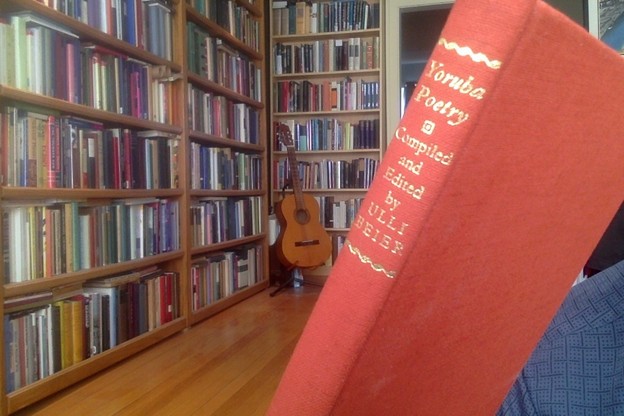Twenty-six items from Special Collections (v)
Exhibit ‘V’: Yoruba. (Anonymous, six animal poems)

Bibliography: Yoruba Poetry: An Anthology of Traditional Poems, compiled and edited by Ulli Beier (Cambridge, 1970).
Comment: A couple of notes from the book:
#1: "Much of the hunters’ Ijala poetry is concerned with the animals in the bush."
#2: "Ijala is the poetry of hunters. It is chanted usually during the festivals of the god Ogun, the god of iron who is worshipped by all those who use iron—hunters, warriors, and circumcision-experts. Their poetry talks about the animals of the bush and about plants. They recite the praise-names of Ogun and the deeds of important hunters. ¶ Some Ijala poems are collections of random remarks and jokes."
I find the mix of registers quite attractive in these pieces. There's stuff in the tonal palette of, like, Beowulf, and then it suddenly gives way to delicious humor and irony. The book gushes with quotable lines, especially in the section of praise poems for the gods ("Shango the God of Thunder" is a knockout) and also the section on riddles, of which I'll give three here.
1. "We are going to Ife—we face Ife. We are returning from Ife—we still face Ife." [climbing and descending a palm tree one faces the same way]
2. "A beautiful maid in a thorny bush." [tongue and teeth]
3. "Five men with four arseholes." [five fingers with only four spaces between them]
Elephant
Elephant, a spirit in the bush,
Elephant who brings death.
He swallows a whole palmfruit
thorns and all.
He tramples down the grass
with his mortar legs.
Wherever he walks
the grass is forbidden to stand up again.
He tears a man like an old rag
and hangs him up in the tree.
With his single hand
he pulls two palm trees to the ground.
If he had two hands
he would tear the Heaven to shreds.
An elephant is not a load for an old man—
nor for a young man either.
Buffalo
The buffalo is the death
that makes a child climb a thorn tree.
When the buffalo dies in the forest
the head of the household is hiding in the roof.
When the hunter meets the buffalo
he promises never to hunt again.
He will cry out: “I only borrowed the gun!
I only look after it for my friend!”
Little he cares about your hunting medicines:
he carries two knives on his head;
little he cares about your danegun,
he wears the thickest skin.
He is the butterfly of the savannah:
he flies along without touching the grass.
When you hear thunder without rain—
it is the buffalo approaching.
Wild Boar
The fat one in the thick forest.
He carries scissors in his mouth
and though we do not wish to marry his daughter
he expects us to treat him like our father-in-law:
we must prostrate to him before we can shoot him.
A randy animal who enlarges his nose
in order to better smell the vagina.
Leopard
Gentle hunter
his tail plays on the ground
while he crushes the skull.
Beautiful death
who puts on a spotted robe
when he goes to his victim.
Playful killer
whose loving embrace
splits the antelope’s heart.
Baboon
So proud in his furry robe
he thinks he can seduce
the hunter’s wife.
He rolls his eyes
his fingernails are golden
he has carved himself
a fine long mouth.
Sitting on top of the tree
he teaches the dog to hunt.
He pelts the farmer
with his own fruit.
He collects creepers
to pay his bride price.
Father of many children
whose wife’s breasts
are never at rest.
Destroyer of our farms,
you pile the corn into the sack
of your mouth.
Four hundred when coming
one thousand two hundred on your return.
You say:
“I am restraining myself today:
If this were not my in-laws’ farm
then trees would fall on trees
and palm trees would fall on palm trees.”
Chicken
One who sees corn and is glad.
Happily eating the worm
unaware of her fate.
Every fool will be buried in the cheek.
The foolish chicken has many relatives:
oil is her uncle on the mother’s side
pepper and onion are her aunts on the father’s side
pounded yam is her in-law.
If she does not see her friend salt for a day
she does not sleep peacefully.
•
Twenty-six items from Special Collections